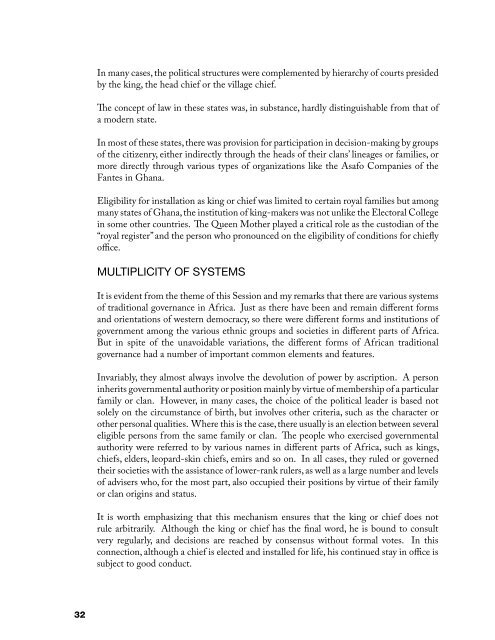Relevance of - United Nations Economic Commission for Africa
Relevance of - United Nations Economic Commission for Africa
Relevance of - United Nations Economic Commission for Africa
Create successful ePaper yourself
Turn your PDF publications into a flip-book with our unique Google optimized e-Paper software.
In many cases, the political structures were complemented by hierarchy <strong>of</strong> courts presided<br />
by the king, the head chief or the village chief.<br />
The concept <strong>of</strong> law in these states was, in substance, hardly distinguishable from that <strong>of</strong><br />
a modern state.<br />
In most <strong>of</strong> these states, there was provision <strong>for</strong> participation in decision-making by groups<br />
<strong>of</strong> the citizenry, either indirectly through the heads <strong>of</strong> their clans’ lineages or families, or<br />
more directly through various types <strong>of</strong> organizations like the Asafo Companies <strong>of</strong> the<br />
Fantes in Ghana.<br />
Eligibility <strong>for</strong> installation as king or chief was limited to certain royal families but among<br />
many states <strong>of</strong> Ghana, the institution <strong>of</strong> king-makers was not unlike the Electoral College<br />
in some other countries. The Queen Mother played a critical role as the custodian <strong>of</strong> the<br />
“royal register” and the person who pronounced on the eligibility <strong>of</strong> conditions <strong>for</strong> chiefly<br />
<strong>of</strong>fice.<br />
MULTIPLICITY OF SYSTEMS<br />
It is evident from the theme <strong>of</strong> this Session and my remarks that there are various systems<br />
<strong>of</strong> traditional governance in <strong>Africa</strong>. Just as there have been and remain different <strong>for</strong>ms<br />
and orientations <strong>of</strong> western democracy, so there were different <strong>for</strong>ms and institutions <strong>of</strong><br />
government among the various ethnic groups and societies in different parts <strong>of</strong> <strong>Africa</strong>.<br />
But in spite <strong>of</strong> the unavoidable variations, the different <strong>for</strong>ms <strong>of</strong> <strong>Africa</strong>n traditional<br />
governance had a number <strong>of</strong> important common elements and features.<br />
Invariably, they almost always involve the devolution <strong>of</strong> power by ascription. A person<br />
inherits governmental authority or position mainly by virtue <strong>of</strong> membership <strong>of</strong> a particular<br />
family or clan. However, in many cases, the choice <strong>of</strong> the political leader is based not<br />
solely on the circumstance <strong>of</strong> birth, but involves other criteria, such as the character or<br />
other personal qualities. Where this is the case, there usually is an election between several<br />
eligible persons from the same family or clan. The people who exercised governmental<br />
authority were referred to by various names in different parts <strong>of</strong> <strong>Africa</strong>, such as kings,<br />
chiefs, elders, leopard-skin chiefs, emirs and so on. In all cases, they ruled or governed<br />
their societies with the assistance <strong>of</strong> lower-rank rulers, as well as a large number and levels<br />
<strong>of</strong> advisers who, <strong>for</strong> the most part, also occupied their positions by virtue <strong>of</strong> their family<br />
or clan origins and status.<br />
It is worth emphasizing that this mechanism ensures that the king or chief does not<br />
rule arbitrarily. Although the king or chief has the final word, he is bound to consult<br />
very regularly, and decisions are reached by consensus without <strong>for</strong>mal votes. In this<br />
connection, although a chief is elected and installed <strong>for</strong> life, his continued stay in <strong>of</strong>fice is<br />
subject to good conduct.<br />
32
















